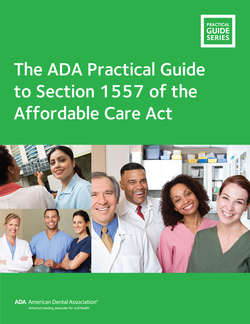Читать книгу Section 1557 of the Affordable Care Act - American Dental Association - Страница 7
На сайте Литреса книга снята с продажи.
Chapter 1: The Basics of Section 1557 Covered Dentists and Dental Practices
ОглавлениеA dentist or dental practice becomes covered by the Section 1557 final rule by receiving certain kinds of government funds from HHS, such as reimbursement under Medicaid or CHIP, or “meaningful use” payments under the Medicare and Medicaid Electronic Health Records Incentive Program. In addition, the government has taken the position that the final rule applies to recipients of reimbursement under Medicare Advantage (Medicare Part C), whether the plan reimburses the dentist or the patient. In order to know if a patient’s insurance is through Medicare Advantage, staff will need to call the 800 number of the plan or check the website on the patient’s identification card to verify the type of plan.
By itself, accepting reimbursement under Medicare Part B, including Durable Medical Equipment (DME) that is reimbursed under Part B, does not make a dentist or dental practice covered by the final rule.
Working at an entity that is covered by the Section 1557 final rule, such as a hospital, does not automatically mean that you are a covered entity. It depends on the nature of your relationship to the entity. If discrimination is alleged at a covered entity where you work as an employee or a contractor, the entity is generally responsible for compliance with the Section 1557 final rule and is subject to enforcement action. However, if you are otherwise covered by the Section 1557 final rule and you are an attending at a hospital, then you would be responsible for compliance and subject to enforcement.
What could happen if a covered dentist or dental practice is found to be non-compliant with the Section 1557 final rule? OCR has indicated that when it finds a violation, the covered entity will be required to take corrective actions, which may include revising policies and procedures and implementing training and monitoring programs. Covered entities may also be required to pay compensatory damages. When a covered entity refuses to take corrective actions, OCR may undertake proceedings to suspend or terminate federal financial assistance from HHS. OCR may also refer the matter to the Justice Department for possible enforcement proceedings. The Section 1557 final rule provides individuals the right to sue covered entities in federal court for discrimination.
